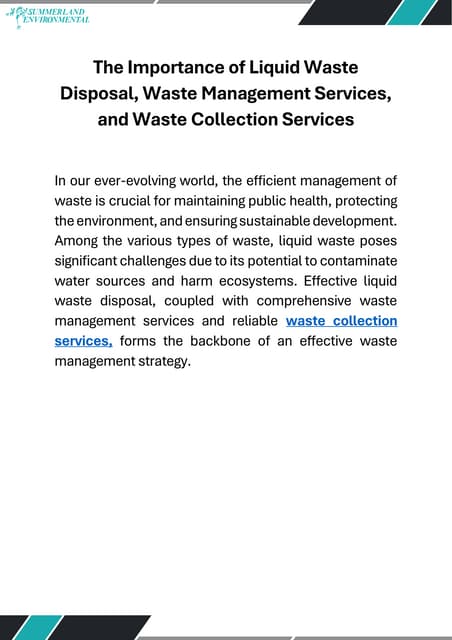5 Simple Techniques For Reclaim Waste
Table of ContentsThe smart Trick of Reclaim Waste That Nobody is Talking AboutReclaim Waste Fundamentals Explained5 Simple Techniques For Reclaim WasteOur Reclaim Waste StatementsHow Reclaim Waste can Save You Time, Stress, and Money.
Discover the kinds, occurrences, and forms of fluid waste. Domestic sewer waste describes the waste and products from a property septic system. This kind of waste is created by human beings in homes, colleges, and other buildings. This only consists of septic systems that have a drain area. The appropriate management and disposal of domestic sewage waste call for fluid waste to be transferred to a sewer treatment plant where the appropriate approaches and devices are put on detoxify and take care of waste.
Business waste often consists of possible threats, such as flammable materials or a mixture of liquid and strong waste items, and requires an advanced and thorough disposal procedure. The disposal of business waste typically includes the purification of waste prior to transport to guarantee risk-free and correct disposal. Hazardous waste is created from by-products and overflow of commercial processes and production.
This kind of waste can not use the same sewer management transportation or processes as septic or industrial liquids. The industrial waste management process calls for the inspection and screening of fluid waste prior to it goes through the disposal procedure (industrial wastewater treatment). Runoff waste is the fluid waste that comes from overflow and excess stormwater in very populated locations or cities
Drainage waste can create contamination and flooding if not taken care of properly. Ensuring correct waste administration can stop catastrophes and decrease environmental harm.
The Ultimate Guide To Reclaim Waste
Contact PROS Solutions today to discover our waste management and disposal solutions and the proper means to take care of the liquid waste you generate.
(https://giphy.com/channel/reclaimwaste1)Do you know what happens to your water when you disengage, purge the commode or drain pipes the washing device? No? Well, it's worth knowing. This supposed 'wastewater' is not only a vital source yet, after therapy, will be launched to our land, waterways or the ocean. Made use of water from bathrooms, showers, baths, cooking area sinks, washings and industrial procedures is called wastewater.

water utilized to cool down machinery or tidy plant and devices). Stormwater, a form of wastewater, is drainage that streams from agricultural and city areas such as roofs, parks, gardens, roadways, paths and seamless gutters into stormwater drains, after rainfall. Stormwater streams unattended straight to neighborhood creeks or rivers, at some point reaching the sea.
Reclaim Waste for Beginners
In Queensland, many wastewater is treated at sewage treatment plants. Wastewater is transported from domestic or industrial sites through a system of sewers and pump stations, understood as sewerage reticulation, to a sewage treatment plant. City governments develop, preserve and operate most sewage treatment plants. Operators are licensed under the Environmental Security Act 1994 to discharge treated wastewater at an acceptable environmental standard right into rivers.
The Department of Natural Resources recommends local governments about managing, operating and maintaining sewage systems and therapy plants. see In unsewered locations, city governments might need homeowners to mount individual or household sewer therapy systems to treat domestic wastewater from bathrooms, kitchens, shower rooms and washings. The Department of Natural Resources authorizes the use of family systems when they are confirmed to be effective.
The majority of stormwater obtains no treatment. In some new communities, therapy of some stormwater to eliminate litter, sand and crushed rock has actually begun using gross pollutant catches. Wastewater therapy occurs in 4 stages: Eliminates strong matter. Bigger solids, such as plastics and various other things incorrectly released to drains, are removed when wastewater is gone through screens.
Wastewater then moves into huge storage tanks where solids settle and are eliminated as sludge. Grease and residue are skimmed from the surface. Utilizes little living organisms called micro-organisms to break down and get rid of staying liquified wastes and great bits. Micro-organisms and wastes are integrated in the sludge. Removes nitrogen and phosphorus nutrients that might cause algal blossoms in our waterways and threaten marine life.
Reclaim Waste Can Be Fun For Everyone
Nutrient removal is not available at all sewage treatment plants due to the fact that it calls for pricey specialist devices. Clear liquid effluent produced after therapy might still consist of disease-causing micro-organisms - industrial wastewater treatment.

This usually means wastewater has actually to be dealt with or pollutants eliminated before it can be discharged to waterways. Most wastewater streams into the sewage system. Under the Act, city governments administer authorizations and licences for eco pertinent activities (Periods) including wastewater releases that could have a neighborhood effect. The department provides approvals and permits to Ages involving wastewater launches that might have a local or statewide effect.
The 4-Minute Rule for Reclaim Waste
Surveillance gives factual details about water top quality and can confirm that licence problems are being met. The info obtained via monitoring offers the basis for making water high quality choices.